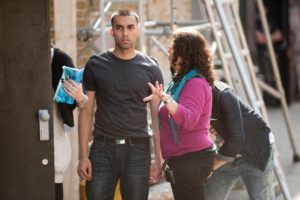
I’m a screenwriter and film director… Just another in the long line of creatives who’ve been drawn to translating what happened to Peoples Temple into thought-provoking art. Thirteen years ago, whilst working for the BBC, I was tasked with researching “Jonestown” for a possible documentary. That’s how I first stumbled across this site. The documentary was never made, but the voices I heard have haunted me ever since.
Hearing the tapes gives an immediacy that history books can’t offer. Listening to the footsteps as people walk down wooden walkways. The birds in the trees. The distant laughter of children. Eavesdropping on a world, frozen in time, my brain began to build images out of what I was hearing. The more I listened, the more I could pick out voices and eventually individual personalities. What struck me most was how familiar these people were. I know people like them. They are like me. If I’d walked into Peoples Temple, I would’ve been impressed by the principled, intelligent people fighting for social change and racial equality, the causes I feel passionate about. I probably would’ve joined.
But how can a single movie tell the story of a thousand lives and 900 senseless deaths? I realised that I couldn’t, so I decided to tell the story of one.
The honesty and beauty of Stephan Jones’ writings on this website both moved and inspired me. I’m fascinated by his complicated relationship with his father. Stephan was also uniquely positioned to look behind the curtain and to experience a side of Jonestown – and of his dad – that nobody else witnessed. Dostoevsky said, “Nothing is easier than to denounce the evildoer; nothing is more difficult than understanding him.” I want to make a film that complicates an audience’s perception of Jim Jones, who is usually written off as a one-dimensional tyrant. Through Stephan – and through Stephan’s reflections on his father – I seek a more nuanced understanding of Peoples Temple and Jonestown.
Four years ago, Stephan gave me his blessing to write and direct a movie from his point-of-view. I’ve been working on it ever since. From the outset, he was always very clear that this was my movie and not his. I nodded in naïve agreement, but it’s only more recently that I’ve come to appreciate what he meant.
Initially, I tried to soak up all Stephan’s memories. He was patient during our weekly calls while I came to grips with the facts of his life. As I wrote early drafts of the screenplay, I bowed under the weight of my research. At one point the screenplay grew to two hundred pages, as I tried to cram in more and more of what I learned from Stephan and the other survivors. The problem was, the drafts felt distant, as if I was looking at events through a pane of glass.
And then it hit me. The trouble with talking to Stephan, and other survivors, is that they have the benefit of hindsight. There’s no avoiding the fact that their memories have been shaped by the deaths in Jonestown. Memory is notoriously unreliable, not just the past remembered, but reconstructed through the lens of the present. That means I was receiving a distilled, composed version of events that distanced me from their direct experience of living it. In order to write my movie, I needed to inhabit the direct experience, to get inside the emotion, so that I was living it with my characters.
I’m now less interested in finding out what happened, and more interested in what people tell themselves happened, and what that reveals about character and motivation. As a storyteller, it’s my job to create a compelling narrative. There are certain patterns and rhythms to a well-crafted story, and sometimes the facts get in the way of telling the greater truth. Ultimately, what I’m writing is a fiction, a lie. But it’s of utmost importance to me personally and morally to honour the truth. So I intend for it to be an honest fiction. An honest lie.
What Stephan was trying to tell me when he said it was my story and not his was, in the words of musician Pete Townshend, “It’s the singer not the song, that makes the music move along.”
I get it now.
(Jones is an upcoming feature film written and directed by Sally El Hosaini, in collaboration with Tessa Ross (House Productions) and supported by The Sundance Institute and San Francisco Film Society. Sally welcomes all contact from the Jonestown community and can be reached through her agent: info@saylescreen.com.)